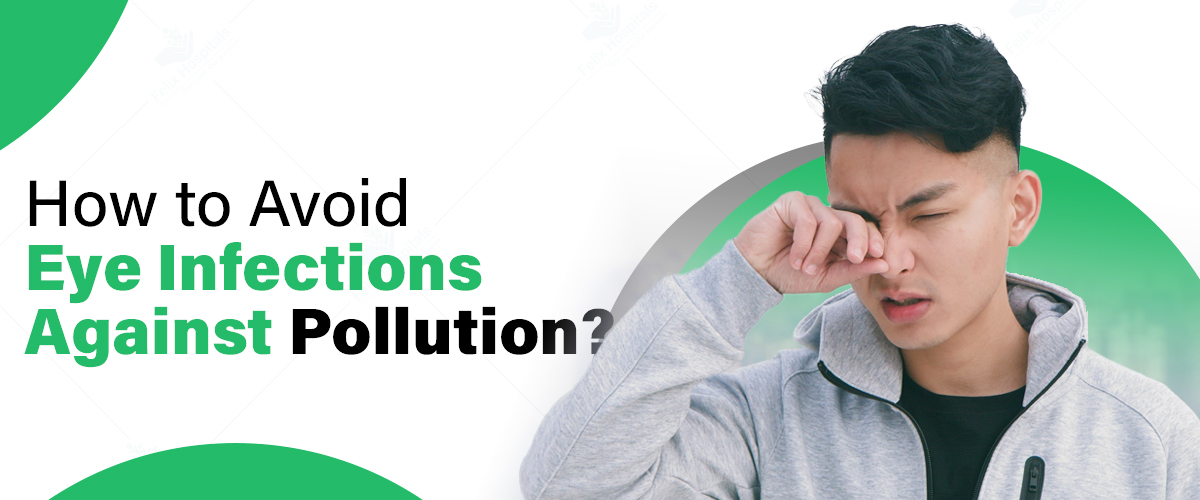
Subscribe to our

Air pollution is a major health risk for all ages, causing respiratory and eye issues. Face masks can reduce inhalation of harmful particles but don't protect the eyes. Studies show that high pollution levels increase eye discomfort, with symptoms occurring 3 to 4 times more often during pollution events. Protecting your eyes from pollution is essential to avoid discomfort and long-term damage.
Worried about your vision? For tips on protecting your eyes from air pollution, reach out to our experts at +91 9667064100.
Pollutants such as sulfur dioxide, nitrogen dioxide, and nitric acid can alter the composition of your tear film, making it more acidic. This can lead to a range of eye problems including redness, excessive tearing, burning sensations, and itchiness. If these symptoms are not addressed promptly, they may escalate into more serious conditions affecting the cornea and potentially impairing your vision.
1. Maintain a Healthy Diet: Incorporate foods rich in vitamins and antioxidants, such as carrots, which can help support eye health and combat oxidative stress.
2. Wear Sunglasses: When outdoors, protect your eyes from direct exposure to pollutants by wearing UV-blocking sunglasses. This can shield your eyes from harmful particles and reduce irritation.
3. Avoid Rubbing Your Eyes: If fine particulate matter gets into your eyes, resist the urge to rub them. Rubbing can exacerbate irritation and potentially lead to further issues.
4. Skip Contact Lenses During High Pollution: If you experience itchiness or discomfort, consider avoiding contact lenses to prevent additional irritation. Switch to glasses until your Eyes feel better.
5. Use Cool Compresses: Applying a cool compress to your eyes can help reduce inflammation and provide relief from irritation caused by pollution.
6. Keep Car Windows Closed: During peak traffic hours, avoid opening car windows to prevent polluted air from entering and affecting your eyes.
7. Practice Good Hygiene: Wash your hands frequently, especially after visiting public places, to reduce the risk of transferring pollutants to your eyes.
8. Install Air Purifiers: Use air purifiers or filtration systems at home to reduce the concentration of airborne pollutants and protect your eyes from related health issues.
9. Use Lubricating Eye Drops: If you wear contact lenses, use lubricating eye drops to keep your eyes moist and clean your lenses regularly with the appropriate solution. Protective eyewear can also be beneficial when pollution levels are high.
10. Stay Indoors During High Pollution: Limit outdoor activities when pollution levels are elevated. If you must go outside, wear protective masks, glasses, and sunglasses to minimize exposure to harmful particles.
11. Immediate Care for Pollutant Exposure: If pollutants come into contact with your eyes, rinse them with clean water immediately. Persistent dryness or soreness should be evaluated by an ophthalmologist to receive appropriate treatment and prevent further damage.
By following these guidelines, you can better protect your eyes from the adverse effects of pollution and maintain your overall eye health.
Dr. Deepanjali Arya
Dr. Deepanjali Arya is renowned for her expertise in ophthalmology, specializing in the diagnosis and treatment of complex eye infections. Her advanced skills in both medical and surgical eye care ensure comprehensive management of various ocular conditions.
Dr. Mohmad Uzair Zakai
Dr. Mohmad Uzair Zakai is a distinguished ophthalmologist with a focus on treating challenging eye infections. His proficiency in cutting-edge treatments and personalized care approaches has earned him a reputation for excellence in the field of eye health.
Protecting your eyes from air pollution is crucial for eye health. Measures like wearing protective eyewear, practicing good hygiene, and using air purifiers can reduce the risk of infections and discomfort. Regular eye check-ups and avoiding exposure to pollutants can further safeguard your vision. Staying informed and proactive about environmental hazards improves your quality of life and supports long-term eye health. If symptoms persist, consult a medical professional for proper care.
Struggling with an eye infection? Contact us at +91 9667064100 for expert guidance and the best treatment plans tailored to your needs.
1. Can air damage your eyes?
Yes, air can damage your eyes, especially if it’s dry, windy, or polluted. These conditions can cause dryness, irritation, and discomfort. Prolonged exposure might lead to more severe issues like conjunctivitis or corneal damage.
2. How can I protect my eyes from air?
To protect your eyes from harsh air, use protective eyewear like goggles, keep hydrated, and apply lubricating eye drops. Avoid prolonged exposure to windy or polluted environments, and consider using air purifiers indoors.
3. How to cure eye infection?
Treat eye infections with appropriate medications such as antibiotics or antivirals prescribed by a healthcare professional. Maintain good hygiene, avoid touching your eyes, and use clean towels to prevent spreading the infection.
4. Are eye infections serious?
Eye infections can be serious if not treated promptly. They can lead to complications such as vision problems or more severe conditions. Early diagnosis and treatment by a healthcare professional are crucial to prevent potential complications.
5. Does ice help eye infections?
Ice can help reduce swelling and provide relief from discomfort associated with eye infections, but it does not cure the infection itself. Proper medical treatment, such as antibiotics or antivirals, is necessary to address the underlying cause.
6. Is it safe to bathe eyes with salt water?
Bathing eyes with a saline solution is generally safe and can help rinse away irritants. However, it may not treat an infection effectively. It’s important to consult a healthcare provider for appropriate treatment options for eye infections.
7. What is the fastest way to cure an eye infection?
The fastest way to cure an eye infection is to see a healthcare professional for a precise diagnosis and receive the correct prescription for antibiotics or antivirals. Following medical advice and maintaining proper eye hygiene are crucial for quick recovery.